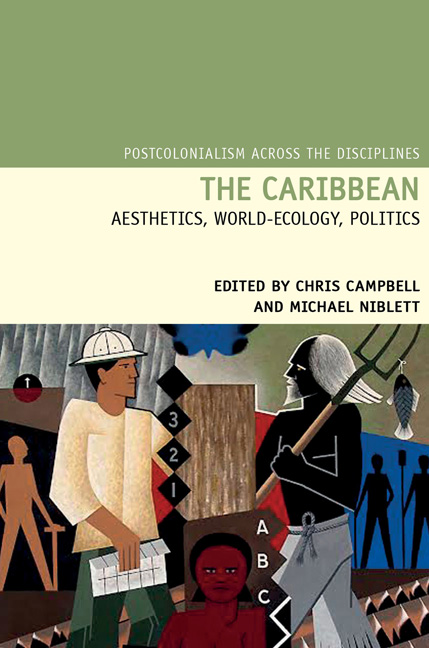Book contents
- Frontmatter
- Contents
- Acknowledgements
- Introduction: Critical Environments: World-Ecology, World Literature, and the Caribbean
- Prologue: The Brutalization of Truth
- Catastrophes and Commodity Frontiers
- Ecological Revolutions and the Nature of Knowledge
- Economies of Extraction: Restructuring and Resistance
- Epilogue: Tingaling
- Notes on Contributors
- Index
Introduction: Critical Environments: World-Ecology, World Literature, and the Caribbean
- Frontmatter
- Contents
- Acknowledgements
- Introduction: Critical Environments: World-Ecology, World Literature, and the Caribbean
- Prologue: The Brutalization of Truth
- Catastrophes and Commodity Frontiers
- Ecological Revolutions and the Nature of Knowledge
- Economies of Extraction: Restructuring and Resistance
- Epilogue: Tingaling
- Notes on Contributors
- Index
Summary
The Caribbean in the World-Ecology
In his magisterial study of environmental change in the Caribbean since 1492, David Watts notes that social scientists have often characterized the region as ‘having been shaped by two of the most severe human traumas of global significance to have taken place within the last four centuries: first, the virtually total and rapid removal of a large aboriginal population following initial European contact; and, later, the forced transference […] of many hundreds of thousands of Africans from their homelands under conditions of slavery to support a system of plantation agriculture’. To these, he suggests, we must add the ‘third trauma’ of ‘environmental degeneration’, which is now ‘of equal and growing importance to the inhabitants’ of the Caribbean (1987, 3). Watts was writing in the 1980s, but his arguments resonate strongly with the contemporary moment, in which the effects on the region of heightened resource extraction and anthropogenic climate change (including rising sea levels and extreme weather events) could be said to have thrust environmental issues into the limelight like never before. But this is somewhat misleading. For if the impact of explicitly environmentalist concerns and debates on popular perception and government policy is relatively recent (one thinks, for example, of the launch of Guyana's Low Carbon Development Strategy in 2009), worries over environmental change and degradation in the Caribbean have a much longer history. Columbus's observations on the relationship between the afternoon rains in Jamaica and the actions of European land clearers ‘provides us with the first documented post-classical instance in a colonial setting of a conscious connection being made between deforestation and a change in rainfall’ (Grove, 1996, 31). By the seventeenth century, colonial observers were growing increasingly alarmed over the impact of the rapid deforestation of island landscapes; and by 1764, ‘programmes of forest protection were quickly being put into effect on newly acquired British territories in the Caribbean’ (10).
A similar argument might be made in connection with Caribbean literature and art.
- Type
- Chapter
- Information
- The CaribbeanAesthetics, World-Ecology, Politics, pp. 1 - 16Publisher: Liverpool University PressPrint publication year: 2016

